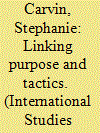| Srl | Item |
| 1 |
ID:
187652


|
|
|
|
|
| Summary/Abstract |
While the Cold War seemingly ended the prospect of nuclear annihilation, in the West it also brought about renewed belief in the utility of force. A warming international political environment and developments in precision technology (as demonstrated by the 1990–91 Gulf War) appeared to create a permissive environment in which western states, particularly the United States, armed with smart weapons, international resolutions and a capacity to engage anywhere and whenever they want to—and all at a low cost—could bring about improvements in some of the most desperate and war-torn places on the planet. Nations who possessed a large, technologically precise and sophisticated hammer could suddenly view world problems as convenient, easily fixed nails. The end result of this vision, however, has been disaster—resulting in flawed intervention after failed intervention, including Somalia, the Balkans, Afghanistan, Iraq and Libya. Indeed, these supposedly ‘easy wars’ have become ‘forever wars’. The question is: why has the West continually failed to learn this lesson? This article explores how the chaos that ensues in the wake of ‘easy war’ conflicts has reinforced a tendency within Washington policy-circles to utilize weapons that are more automated and/or remove individuals from the battlefield entirely. The lesson that technology cannot conquer the ‘fog of war’ to create costless victory or replace the hard work of politics and diplomacy is never learned. And even as President Joe Biden's administration begins to pivot towards Russia and Asia, it is likely that this tendency will endure.
|
|
|
|
|
|
|
|
|
|
|
|
|
|
|
|
| 2 |
ID:
081991


|
|
|
|
|
| Publication |
2008.
|
| Summary/Abstract |
The critique of the laws of war (and international law in general) coming out of America as the war on terror began seemed to have emerged as a response to the horror of 9/11 and the belief that the United States was now engaged in a "new paradigm" of warfare. However, the Bush administration's argument needs to be situated in a wider historical context. The source of the arguments against applying the Geneva Conventions to the prisoners caught in Afghanistan emerged well before 9/11 and can be traced to the end of the Cold War. These doctrines emerged out of the work of the "new sovereigntists" and out of the frustrations guided by coalition warfare. This paper seeks to trace the origin of these arguments which challenge the traditional division between jus ad bellum (the law governing the resort to force) and jus in bello (the law governing tactics in warfare).
|
|
|
|
|
|
|
|
|
|
|
|
|
|
|
|
| 3 |
ID:
080137


|
|
|